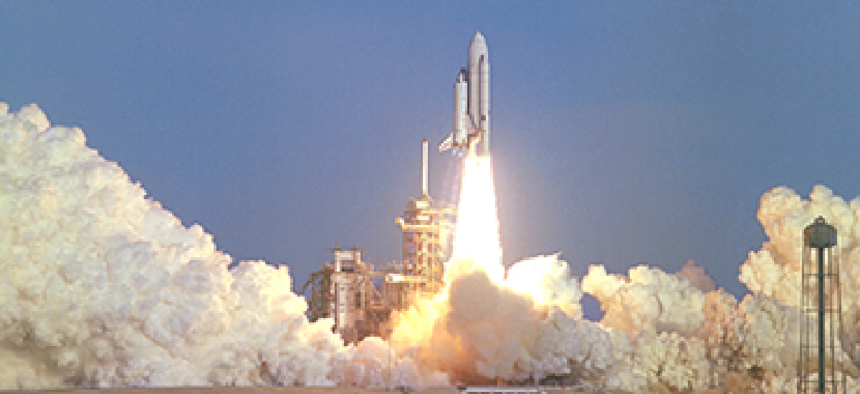Is federal leadership on the decline?

NASA tops the list in the 2012 Best Places to Work analysis, but governmentwide scores drop for the first time.

NASA may be keeping a lower profile with the end of the shuttle program, but it's still rated the top agency for effective leadership, a survey finds. (NASA photo)
A new study shows that federal employees are increasingly unhappy with agencies' top brass, and few hold their senior leaders in high regard. But according to one expert, turning around that trend starts with one simple step: clear communication.
Analysis by the Partnership for Public Service and Deloitte found that although federal employees have never given their leaders particularly high marks, satisfaction with leadership dropped in 2012 for the first time since the Best Places to Work in the Federal Government study was launched in 2003. The leadership score was 52.8 on a scale of 100, 2.1 points lower than in 2011. The research is based on data from the Office of Personnel Management's 2012 Federal Employee Viewpoint Survey.
Government bashing and budget cuts remain the main reasons for the slipping numbers, said Max Stier, president and CEO of the Partnership for Public Service. "For leadership in government, these problems from the outside make it harder for them to engage with employees in these troubling times," he said.
Senior leaders across government scored only 46.7 out of 100 -- 2.6 points lower compared to the previous year. Only four of 10 employees said their senior leaders could motivate employees, while fewer than half said they get clued in by senior leaders on what is happening in the agency. Just half of the respondents said they respected their senior leaders and that those leaders were honest and had integrity.

The Partnership for Public Service survey shows the recent drop in opinion of agency leadership.
First-line supervisors were slightly better at effective leadership than more senior managers. In 2012, supervisors scored 62.3 out of 100, more than 15 points higher than senior leaders. Yet, satisfaction with supervisors still dropped 1.6 points from the 2011 score.
Overall, six of 19 large agencies showed a boost in their effective leadership score. NASA (68.1), the intelligence community (63.1) and the State Department (59.5) scored the highest, while the departments of Labor (50.7), Veterans Affairs (47.5) and Homeland Security (45.7) ranked last.
"Not only does NASA top the list but the agency saw an improvement in scores from previous years," Stier said. "Even with the difficult times we have, it's possible to have great, effective leaders."
NASA's recipe for effective leadership is based on good communication and providing a clear vision of where the agency is going and the roadblocks ahead, Stier said. "Leaders may not have all the answers, but they do need to communicate to employees on a regular basis about the challenges they're facing," he said.
The low numbers for DHS might be troubling, but all hope is not lost, Stier said. "What any agency at the bottom of the list has to do is examine why it isn't effectively connecting with its employees. So much is around good communication -- and not just one-way communication."
The report's recommendations for how agency leaders can improve the workplace include empowering employees and making them feel valued.
"By and large, in the federal government, good management is frequently not a priority," Stier said. "Agencies are consumed by the immediate and the urgent, and [they] don't pay attention to the long-term importance of the quality of leadership or the time being spent managing."
NEXT STORY: Roger Baker joins Agilex


